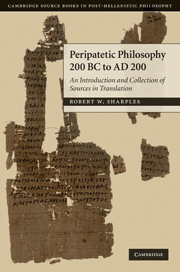Book contents
- Frontmatter
- Contents
- Preface
- Abbreviations
- Introduction
- Individuals
- Logic and ontology
- Chapter 7 The Categories
- Chapter 8 The Categories
- Chapter 9 The Categories
- Chapter 10 The Categories
- Chapter 11 On Interpretation
- Chapter 12 Ontology
- Chapter 13 Logic
- Chapter 14 Theory of knowledge
- Ethics
- Physics
- Bibliography
- Index of sources
- Index of passages cited
- Index of personal names (ancient)
- General index
Chapter 12 - Ontology
form and matter
Published online by Cambridge University Press: 05 June 2012
- Frontmatter
- Contents
- Preface
- Abbreviations
- Introduction
- Individuals
- Logic and ontology
- Chapter 7 The Categories
- Chapter 8 The Categories
- Chapter 9 The Categories
- Chapter 10 The Categories
- Chapter 11 On Interpretation
- Chapter 12 Ontology
- Chapter 13 Logic
- Chapter 14 Theory of knowledge
- Ethics
- Physics
- Bibliography
- Index of sources
- Index of passages cited
- Index of personal names (ancient)
- General index
Summary
Arius Didymus (?), Fragments on Physics 3 (Dox. 448.13–28)
(1) Aristotle sometimes says that these principles are two, the matter and the form, which he also calls shape and actuality [entelekheia] and the-what-it-was-to-be and the being/substance [ousia] according to the account, and the activity/actuality [energeia]. This is how rich and many-named the form is for him. (2) The form is different from the shape in so far as the former extends through the depth, while the latter is on the surface; the one is like the whiteness in painting, while the other gives form to the substance [ousia] of milk. But the same is also called form inasmuch as the one gives form to the matter and the other gives it shape. (3) He called it actuality [entelekheia] either because it is present completely [entelekhōs] or because it makes each of the things that participate in it complete [teleion]. For the bronze is not yet a statue, except potentially, but when it has been fashioned and has taken on the appropriate shape it is said [to be a statue] in actuality; for then it has received its completion [telos]. (4) He called it the what-it-was-to-be because it gives the capacity of being to each of the things that are; and being according to the account because it is different from the [being] according to the matter, as the statue [differs] from the bronze and the cup from the silver and whatever statue it might be from the stone. For that by which these go beyond the matter, from which they have been crafted, is the being according to the account. (5) He called it activity/actuality because none of the beings could be active/actual without having first been given form.
Stobaeus, Selections 1.13.1b (138.9–12 Wachsmuth 1884) = Aëtius 1.11.4
They say that Aristotle indicated each [cause] by using expressions such as the following, saying that that from which was the matter, that by which the agent, that according to which the form, that on account of which the end.
- Type
- Chapter
- Information
- Peripatetic Philosophy, 200 BC to AD 200An Introduction and Collection of Sources in Translation, pp. 75 - 89Publisher: Cambridge University PressPrint publication year: 2010



